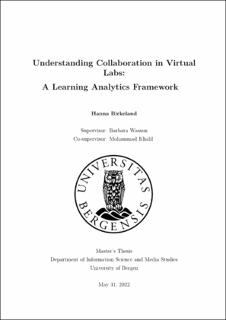Understanding Collaboration in Virtual Labs: A Learning Analytics Framework
Master thesis
Permanent lenke
https://hdl.handle.net/11250/3001938Utgivelsesdato
2022-05-31Metadata
Vis full innførselSamlinger
- Master theses [203]
Sammendrag
Online education is increasing and progress within technology has inspired the development of virtual laboratories, which allow students to conduct experiments online. One of the main challenges of virtual laboratory environments is facilitating collaboration similar to those existing in physical laboratory settings. This research explores how one can obtain a better understanding of collaboration in virtual labs through the use of learning analytics. The research work of this thesis was carried out within the frame of design science research, where the main contribution is an artefact in the form of a learning analytics framework. The aim of the artefact is to provide a guiding framework for the integration of learning analytics to better understand and support learning and collaboration in virtual labs. The artefact was evaluated in two iterations using semi-structured interviews with seven experts. It was found through the artefact development process that social network anal- ysis, statistical analysis, natural language processing, and sentiment analysis are valuable data analysis methods for identifying patterns within collaboration in virtual labs. A proposal of a learning analytics dashboard has proved to be a valuable tool to visualise the analysis to the stakeholders in question (students and instructor). The overall reception of the framework was understandable and well-presented. The contribution of this research provides opportunities for future work which involves putting the framework into practice. The implementation of learning analytics to support collaboration in virtual labs can make it easier for students to reflect on their own performances and thereafter improve from it, as well as supporting instructors to reflect on their teaching methods and provide assistance to students in need.
